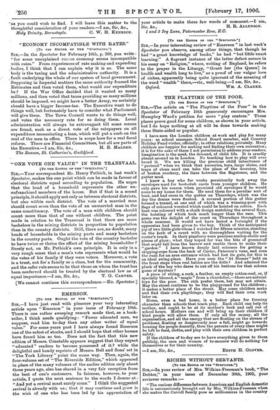THE PLAYTIME OF THE POOR.
[TO THE EDITOR Or TEE "SPECTATOR."] SIR,—The article on "The Playtime of the Poor" in the Spectator of February 10th generously encourages Mrs. Humphry Ward's petition for more "play centres." These places prove good for some children, as shown in your article, but I do hope nothing at all will be done towards making them State-aided or popular.
I have seen the London children at work and play for many years: as school manager, School Board member, and Country
Holiday Fund visitor, officially ; in other relations, privately. Many children are happier for seeking and finding their own recreation ; it is for the sake of these I ask permission to address your readers.
Imagination is the need, the demand, of child life. It is cruelly
absent around us in London. No teaching how to play will ever breed it. We are killing the precious child inheritance of
"pretend" when we think that nurseries, toys, large slates, and trays of clean sand can take the place of the doorstep, bits of broken crockery, the lines between the flagstones, and the gutter mud.
I knew a boy who for weeks persistently took away the envelopes used for boot-club cards from younger children. He only gave his reason when promised old envelopes if he would come to my house for them. He used them for a peculiar sort of boat, and had races in the gutter on Thursdays, which was the day the drains were flushed. A covered portion of this gutter formed a tunnel, at one end of which was a winning-post with flags of coloured worsted which could be hoisted on cotton. Each boat was coloured with a chalk design matching the several flags,
the hoisting of which took much longer than the race. This game was the delight of the court on Thursdays throughout a whole summer. It would not have lasted a fortnight if the apparatus had been given to the boy. Think of the anticipated joy of two little girls whom I watched for fifteen minutes, standing
on the kerb of a court with no thoroughfare waiting for the coster's truck. In their pinafores were precious scallop-shells and pieces of glass ; what they hoped for was the bits of greenstufl that might fall from the barrow and enable them to make their "garden." I have known deeply laid schemes for getting a skipping-rope from the back of Carter, Paterson's vans, and seen
the rush for an area entrance which had lost its gate, for this is an ideal swing-place. Have you seen the "At Homes" held on the front steps when real babies are the dolls ? And admired the pluck of the boy who dares to cut off his buttons for that solemn game of mystery?
A piece of string, a cork, a feather, an empty cotton-reel, or, if specially blessed, a "magic" from a chandelier,—these are natural toys for the poor. The rich prefer them, but may not attain. May the street continue to be the playground for the children ; it makes a better place of the street. May some children make and find their own playthings ; they will find their own work later on.
Home, even a bad home, is a better place for forming character than schools that teach play. Each child can help its mother, and ought to be at its mother's beck and call out of school hours. Mothers can and will bring up their children if kind people will allow them. If only all the money, all the organisation, and all the energy that are floating on the stream of problems, floating so dangerously near a fall, might go towards housing the people decently, then the parents of every class might be left to feed, clothe, and play with their own children in perfect safety.
If the children of to-day are to have everything given to them publicly, the men and women of to-morrow will do nothing for themselves or for their country.
—I am, Sir, &c., EDITH H. GLOVER.










































 Previous page
Previous page